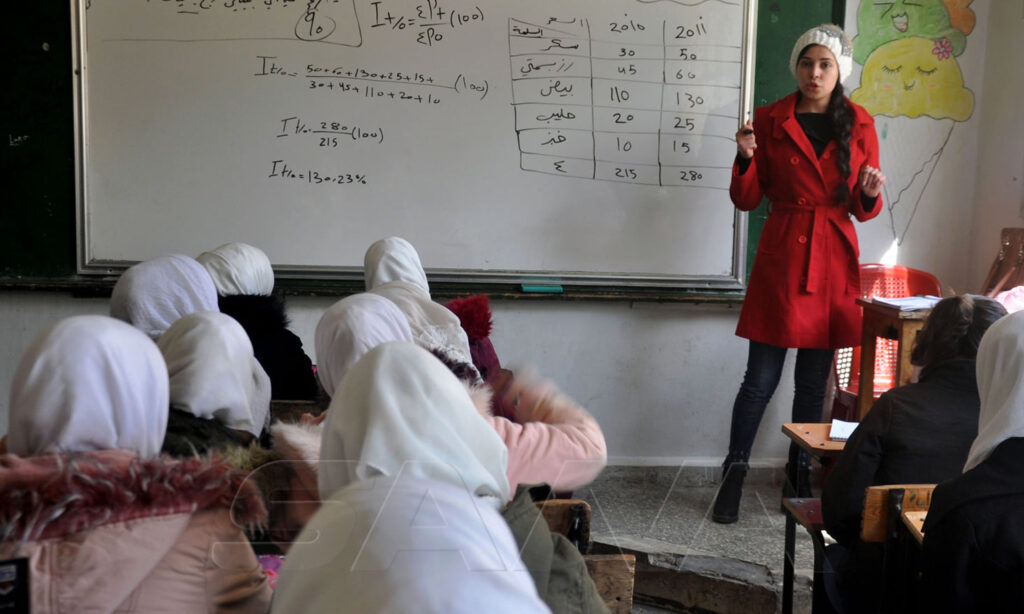Enab Baladi – Homs
Mohammad, 43, a mathematics teacher, leaves his home at six in the morning and does not return until midnight, moving between residential neighborhoods in the central city of Homs, to answer the questions of the students who contacted him and to solve for them the important questions that they encountered during their studies.
The teacher wants to make sure that his students are ready for the exams that are approaching, and he achieves a double benefit by compensating what students lack and improving his income this season.
The Syrian Ministry of Education has set a date for the preparatory certificate exams on 29 May, and the middle and high school certificate exams in its literary and scientific branches start on 30 May.
Because of the deteriorating educational situation in public schools, students resort to private lessons in institutes and private schools during their study of the educational curricula for the middle and high school certificates.
This increased the demand for private lessons and raised their fees to the extent that is no longer accessible to all students in the city of Homs, which prompted some of them to gather in groups and pay the tuition fee after dividing it among the attendees.
High prices for private lessons
As the exam date approaches, the prices of private lessons more than doubled and are likely to rise more the closer the date gets.
The fees for private lessons rise with the increase in transportation costs and the cost of living. For teachers, private lessons are the most important source of their livelihood because of their low wages in public schools, which do not exceed 80,000 Syrian pounds per month.
Mathematics teacher Mohammad told Enab Baladi that the prices of teaching hours have increased with the increase in transportation costs and the increase in demand ahead of exams. I cannot rely on public transportation, as it is slow and takes a lot of time.
“I depend either on my own car or on the public taxi. Gasoline prices have gone up, the price of a liter of gasoline is about 6000 pounds, and the lowest fare for requesting a taxi costs more than 5000 pounds. These expenses are at the price of one hour’s wages,” says Mohammad.
This is a season for teachers who often rely on tutoring to improve their livelihoods amid the rising cost of most materials and basic goods.
The exchange rate of the US dollar against the Syrian pound reached 3,970 pounds, according to the Syrian Pound Today website, which specializes in exchange rates and foreign currencies.
Students initiatives
Somaya, 47, a resident of the city of Homs, said that her son, a high school student, is on a date with fateful exams, as she told Enab Baladi.
“The prices of private lessons have increased significantly in the recent period,” Somaya, who works as a public employee with a monthly salary of 80,000 Syrian pounds.
“At the beginning of the year, the wages of a mathematics professor was 10,000 per hour, but now it is 35,000 Syrian pounds for some teachers, this is other than physics, chemistry, and the rest of the subjects,” she added.
The high costs have reached the point where most parents are unable to pay them to the teachers, which is reflected in the students’ educational level.
This poor living condition of the parents prompted the students to gather in small groups in one of the students’ houses to share the fees of private lessons and courses.
Poor public education
Most students in transitional classes, especially middle and high school diplomas, resort to private lessons or to private institutes and schools licensed by the Ministry of Education to review the curriculum after the low level of education in public schools.
Ammar, 46, an English language teacher in a school in Homs governorate, told Enab Baladi that “public schools lack seriousness in education, as most students rely on private institutes or private lessons, which increases their dropping out of classes.”
According to the teacher, who requested that his full name not be disclosed for security reasons, most of the teachers said they lost the incentive to present their professional and scientific thesis because they hardly get a salary that suffices them with transportation costs, not to mention the full commitment to working in classes and the lack of time as in other state institutions.
Governmental schools lack the basic components after the destruction that affected them as a result of the military operations launched by the Syrian regime during the opposition factions’ control over neighborhoods in the province. This reality forced the Education Directorate to limit working hours to renovated school buildings and divided school hours into two periods, morning and evening.
According to estimates by the United Nations Children’s Fund (UNICEF), the number of children deprived of education in Syria during the ten years of war has exceeded two million.
The Syrian education system is fragmented and unable to provide safe, equitable, and sustainable services to millions of students and suffers from a lack of funding, in addition to the great fatigue of the teaching staff.

